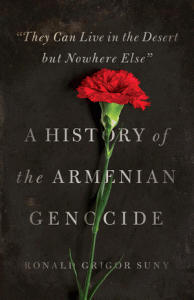April 24 this year will mark the 100th anniversary of the start of the Armenian Genocide, an atrocity whose international repercussions are still widely felt today. Drawing on archival documents and eye-witness accounts, Ronald Grigor Suny’s They Can Live in the Desert but Nowhere Else: A History of the Armenian Genocide (April 2015) tells a deeply informed but accessibly written narrative of the events of 1915-16. Taking into consideration questions of nationalism, empire, identity, and propaganda, They Can Live in the Desert but Nowhere Else provides a rich and multi-faceted portrait of an unstable Ottoman Empire on the brink of modernity and the cusp of collapse.

Ronald Suny, an Armenian-American scholar of Russian and Caucasian history, and the great-grandson of genocide victims, notably explores the important—but widely understudied—role that Russia and the Russian border played in tensions between the Young Turks and ethnic Armenians.
Examining the psychological factors, as well as the international and domestic events, that helped lead to the genocide, he outlines how the loss of Ottoman territory during World War I, and the rise of an increasingly homogenous Muslim-Turkic state, resulted in deep-seated imperial anxiety. Young Turk leaders, fearful of the empire’s Christian-Armenian minority aligning with Russia to form a breakaway nation, became convinced that the survival of the state depended on the Armenians’ elimination. The tragic legacy of their actions—the forced deportation and death of hundreds of thousands of individuals—remains deeply relevant to international relations in the 21st century.



Here we go again with the pro-Turkish Ron Suny.
He says, as he has said before, that the Turks committed genocide because they they had an anxiety attack over Armenians’ possibly siding with the Russians.
Is that why Turkey committed genocide against Assyrians too during the same period?
Is that why Turkey committed genocide against Armenians in the 1890s and massacred Armenians in 1909?
Why did the Turks continue to commit genocide even AFTER WW 1?
I would rank Suny’s ideas right up there with Melanie Toumani’s.
He’s a loose cannon.
I remember years ago, a magazine about the Middle East talked to him and he said that he’d like to see Armenia, Georgia, and Azerbaijan be one united country. Yes, he said it. A nice recipe for disaster.
I have also seen him say, in writing, that he is not an Armenian nationalist. Like we didn’t know that already.
I have no time for the likes of R.Suny and others like him,nor do I trust him.
I’m looking forward to Ronald Suny’s new book, having read him before and learned a great deal. His book on the modern history of Georgia stands out for me.
I heard him lecture in Sydney years ago on the psychology of the Young Turks and found it a unique approach. Yes, psychology plays a role in history and political science, indeed in all human relations.
Suny has made valuable contributions in the fields of history and political science scholarship. For those who are unfamiliar with him I highly recommend his lecture “The Persistent Past” on 23 April 2012. It is captured in YouTube as linked below. It is both a remarkable and rare insight on how much has changed for Armenians, Turks and Kurks, as captured by scholarship.
https://www.youtube.com/watch?x-yt-ts=1421914688&x-yt-cl=84503534&list=PL51A2BDABA349750A&feature=player_detailpage&v=O6hF-OM2G6o
My apologies, that link should have been this one: https://www.youtube.com/watch?x-yt-ts=1421914688&x-yt-cl=84503534&list=PL51A2BDABA349750A&feature=player_detailpage&v=O6hF-OM2G6o